The No Cry Nap Solution (8 page)
Read The No Cry Nap Solution Online
Authors: Elizabeth Pantley

what I call your baby’s ‘Fourth Trimester.’ ”
—Harvey Karp, M.D., author and creator of the book, CD,
and DVD The Happiest Baby on the Block
on your due date). You are the best judge of your own baby, so let
your instincts guide you to know when your baby graduates from
the newborn stage into babyhood and a more structured day/night
sleep pattern.
Sleep Consolidation: Growing from
Newborn to Baby
Sleep consolidation is a biological process whereby your baby
begins to sleep fewer overall hours while those hours consolidate
so that the majority occur during nighttime, and daytime sleep
settles into two or three longer naps. Sleep consolidation begins
when your baby is two months of age or older. Biological con-
solidation is just the beginning, though—it doesn’t automatically
equal great naps and sleeping through the night. It just opens the
door for a process that takes time to mature and many months
to complete. What’s more, individual development and tempera-
ment, plus cultural, social, and other outside factors, all have an
infl uence on your baby’s sleep patterns.
To understand your newborn’s sleep pattern, it can help to con-
sider that not too many days ago your baby was nestled in the
Growing into a Napping Rhythm
37
sleep-inducing womb. The environment was consistent and per-
fect for sleep, and your baby slept twenty hours a day or more.
Waking periods were random and for very short periods of time.
The kicking and poking that you felt were often movements made
during sleep—a fetus is a very active sleeper.
The moment after birth, your child doesn’t drastically or instantly
change—your newborn will continue the same sleep-wake pattern
for weeks. At this time you will be adjusting to life as a new parent,
which takes a tremendous amount of energy, and perhaps recover-
ing from childbirth as well. (This, by the way, is the scientifi c justi-
fi cation for you to sleep when your newborn sleeps!)
During the newborn stage it is hard to separate the facts that
pertain to naps versus those that apply to nighttime sleep, since
they are so closely intertwined. Therefore, the benefi t here is that
when you understand how to help your newborn take better naps,
you’ll likely also see an improvement in her nighttime sleep.
Pay attention to the nap routines that you are creating with
your newborn baby. Construct patterns that you will be
comfortable continuing for three or four months. Stay alert
to signs that your baby’s sleep biology is maturing, and make
appropriate changes. If you miss the transition from new-
born to baby, you may fi nd that today’s routines will con-
tinue for a year or longer.

Nap Facts
Newborn Babies
Newborns cannot be put on a sleep schedule, and it can be
dangerous to your infant’s well-being to even try. During the
fi rst weeks of your baby’s life, he sleeps when he is tired—it’s that
simple. You may be able to force a new baby to sleep by manipulat-
ing his environment, and you can wake him up when he is sleep-
ing soundly, but it’s not an easy task. The best approach for your
newborn is to respect his sleep needs. Learn how to read his sleepy
signals and allow him to sleep when he wants to sleep.
Newborn Babies Have Short Sleep Cycles
Not only do newborns have very short sleep cycles, they wake eas-
ily between cycles. This pattern is thought to act as a protective
device—babies need lots of care and feeding, and they need to
gain the attention of others to tend to their needs. Infants require
food every few hours, so their light sleep cycles accommodate their
need to wake to eat. Babies who are born prematurely or with
special needs will sleep even more lightly with shorter sleep cycles,
which is nature stepping in to be sure these special babies get the
extra care that they require.
New Babies Need to Eat Frequently
In the womb, babies don’t need to think about eating. Because
their nutritional needs are continuously met, they never feel hun-
ger. After birth, babies must adjust to a different reality. Hunger
38

Nap Facts: Newborn Babies
39
is a new sensation. Furthermore, they are growing rapidly, their
tummies are small (the size of one miniature fi st), their diet is liq-
uid, and it digests quickly. To fuel their amazing growth, newborns
need to eat every two to four hours—and sometimes more fre-
quently—day and night.
By the time your baby is three to four months old, he’ll be able
to “sleep through the night,” which for an infant means fi ve con-
secutive hours of sleep without waking for a feeding. (A small
number of babies achieve this milestone sooner.) It’s important
to realize that even when your baby begins to sleep for seven or
more hours at a stretch, he may begin that span at 7:00 p.m., which
means he’ll be waking for a feeding at 2:00 a.m.
Newborn Babies Do Not Need to Be
“Taught” How to Sleep
New babies don’t need sleep lessons. They’ve been sleeping for
twenty hours a day in the womb—they
know
how to sleep! New-
Vivian and Hudson, twins, four days old
40 Newborn Babies
born babies don’t have sleep problems, either. However, their
environment can cause disruption to the sleep that they crave. If
allowed to follow their own personal sleep patterns, infants will
sleep as much as they need to, whenever they need to. It is a par-
ent’s job to protect their new baby’s need for sleep and provide a
safe and comfortable place for it to occur at the right times.
Babies don’t fi ght sleep on principle, but they will fail to sleep
if the routine doesn’t match their needs. If you understand your
baby’s napping needs and put him down for naps at the right
times, he will welcome them.
Newborns Like to Sleep on Their Tummies,
but They Need to Sleep on Their Backs
Major pediatric groups recommend that almost all newborns sleep
on their backs as the most effective method of reducing the risk
of sudden infant death syndrome (SIDS). The occurrence of SIDS
has decreased by over 50 percent since the recommendation was
fi rst made in the 1990s. Any exceptions should be approved by
a medical professional, and other safeguards should be taken to
protect the baby. (If your baby resists sleeping on his back, see the
ideas beginning on page 185.)
Babies Are Noisy Sleepers
Most newborns are not calm, quiet sleepers. They grunt, coo,
whimper, and even cry in their sleep. These are what I call
sleeping
noises
, and your baby is sound asleep during these episodes.
Babies move through sleep cycles and shift from deep sleep
to light sleep with brief awakenings between cycles. If your baby
is not hungry, she may move around, make noises, get resettled,
and fall back to sleep on her own. However, if a parent rushes
Nap Facts: Newborn Babies
41
to her side in the middle of this process, she will wake up fully.
The result is a wide-awake but overtired baby! Over time, this pro-
cess of being fully awake between cycles becomes a baby’s adopted
sleep pattern, preventing the natural elongation of sleep spans
from occurring.
This experience is particularly common for breastfeeding, co-
sleeping mothers. They become very tuned in to their baby’s every
noise or movement—which is, of course, wonderful. The problem
is that mothers often interpret every sound or action as a cue to
put baby to the breast. My fourth baby, Coleton, would merely
sniff and I would attach him—almost by instinct, in my sleep!
The problem here is that half the time, the baby is making sleep-
ing noises or merely “getting comfortable.” My Coleton eventu-
ally learned how to put himself back to sleep on his own when I
started allowing him to do so.
Newborn Babies Are Active Sleepers
During sleep, your baby’s little fi ngers will twitch, his legs and arms
will move, and his facial expressions will change. He may make
sucking motions, and he will change his entire position, squirm-
ing or fi dgeting. All of this activity is normal, and it is done during
sleep, so it doesn’t require any intervention from you.
Newborn Babies Cannot Be Spoiled
New babies cannot manipulate people, and they can’t be stub-
born. Their needs are basic instinct. They require pampering, and
they deserve as much holding, cuddling, nursing, and rocking as
we can give. As a matter of fact, studies tell us that babies who are
carried and cuddled throughout the day will fuss and cry less than
those left too often to their own devices.

42 Newborn Babies
Granddaddy Gary and Evan, six months old
Parents of Newborns Need Time for
Adjustment
This is a unique and wonderful time for you. It is time to learn
about this brand-new little person in your life. Be open to letting
your baby tell you about himself. Don’t try to make him fi t into
any preconceived image that others have created for you about
babies and sleep. Relax, enjoy, follow your baby’s lead, and take
things one day at a time.
Professional-Speak
“When it comes to sleeping, whatever your baby does is
normal. If one thing has damaged parents’ enjoyment of
their babies, it’s rigid expectations about how and when the
baby should sleep.”
—James McKenna, Ph.D., Director, Mother-Baby Behavioral
Sleep Laboratory, University of Notre Dame,

